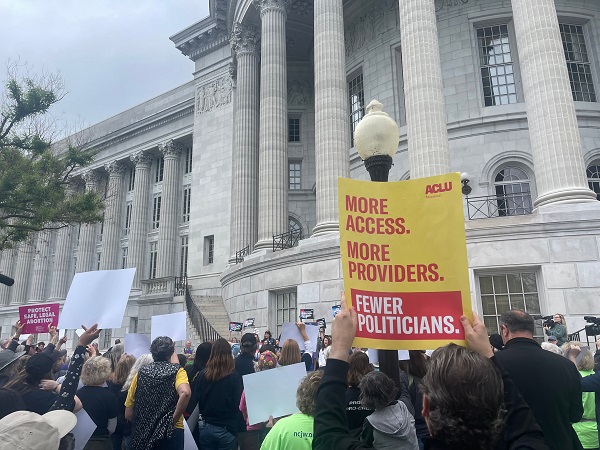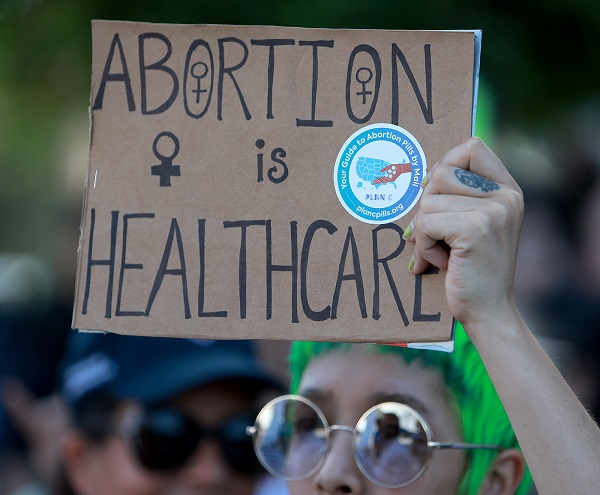By Avi Bajpai and Luciana Perez Uribe Guinassi
The Charlotte Observer bulletin news North Carolina abortion restrictions
(The Charlotte Observer) More than a year after the lawsuits were filed, two legal challenges targeting North Carolina’s abortion restrictions remain in court.
One case focuses on two provisions of the 12-week abortion ban GOP lawmakers passed last year. While the main thrust of that law went into effect July 2023, and has not been successfully challenged in the courts, two of the law’s provisions were challenged by Planned Parenthood and other abortion providers, and have been temporarily blocked since September.
The second case takes aim at the state’s restrictions on medication abortions, and was filed in January 2023, after the conservative-majority U.S. Supreme Court overturned the constitutional right to abortion, but before North Carolina passed its new law.
U.S. District Judge Catherine Eagles, who has heard arguments in both cases, issued a ruling in the medication abortion case last month — which is now being appealed — and is expected to issue a ruling in the other case soon.
Here’s a look at how the two cases originated and where they stand now.
bulletin news North Carolina abortion restrictions
Planned Parenthood’s lawsuit over new abortion law
The case challenging provisions of the state’s new abortion law began in June 2023, when Planned Parenthood filed a lawsuit in federal court, and sought a temporary restraining order to prevent the entire law from taking effect as the legal challenge moved forward.
(In addition to lowering the threshold after which most abortions are banned to 12 weeks, the law also put into place additional requirements for patients and providers, including a requirement that women receiving medication abortions complete two additional in-person appointments. The law also included more than $180 million in state and federal funds for services including child care and foster care.)
Eagles didn’t grant that request but blocked one provision of the law, which requires physicians who prescribe medication abortions to document the existence of a pregnancy within the uterus at the early stages of gestation.
Abortion providers who challenged the law have argued the provision doesn’t give guidance on how to satisfy the requirement, and could block physicians from prescribing abortion pills early in pregnancies, when an embryo may not be able to be located using an ultrasound.
Eagles agreed with those concerns and issued a preliminary injunction in September, calling the provision “unconstitutionally vague.”
bulletin news North Carolina abortion restrictions
In that order, Eagles said the restriction on medication abortions didn’t provide physicians with “a clear standard,” was “open to differing interpretations,” didn’t provide “reasonable notice of what is prohibited,” and could subject physicians to “arbitrary accusations that they have violated the provision.”
Eagles temporarily blocked another provision in that order as well.
That provision would have required anyone trying to terminate their pregnancy after 12 weeks — under one of the law’s exceptions for rape and incest, fetal abnormalities, or severe medical emergencies — to have the procedure in a hospital. That provision had also been temporarily blocked since September.
Where does the case stand now?
In June, Eagles heard arguments from attorneys representing Planned Parenthood South Atlantic; the N.C. Department of Justice; and Republican legislative leaders, who intervened in the case to defend the new law.

A bench trial had been scheduled for July 22, but Eagles decided after the hearing trial wouldn’t be needed, since her ruling would likely “resolve all issues in dispute,” and removed the case from the July trial calendar.
A ruling hasn’t been issued yet.
bulletin news US District Judge Catherine Eagles
OB-GYN lawsuit over regulations on abortion pills
In the other case, a UNC Health OB-GYN sued North Carolina over regulations on the use of medication abortion.
Dr. Amy Bryant challenged state laws in place around prescribing mifepristone, such as requiring doctors to provide the pill in-person at certified facilities, and after a 72-hour waiting period. Bryant argued that the U.S. Food and Drug Administration’s requirements, which are more lenient, preempt North Carolina’s restrictions.
The top legislative leaders, House Speaker Tim Moore and Senate leader Phil Berger, joined the lawsuit as defendants. In court filings, they argued the FDA does not have the final say over “one of the most divisive and consequential social and political issues of our day and the past fifty years.”
But Eagles ruled largely in favor of Bryant, striking down several of the state regulations.
She decided other requirements were not preempted by FDA regulations, such as requirements for an in-person, 72-hour advance consultation and blood type testing, and allowed them to stand.
That means that currently, in North Carolina:

Mifepristone does not need to be taken in a clinical setting and can be taken in one’s own home.
The pill can be provided by pharmacies and not solely by licensed physicians.
bulletin news US District Judge Catherine Eagles
A follow-up appointment is not required, but an advance consultation is.
Enforcement, penalization, or requiring compliance with any medication abortion provisions preempted by the FDA is prohibited.
But Eagles’ ruling could be reversed. On June 20, Berger and Moore appealed the portion of the ruling that went against them to the federal appellate court encompassing Maryland, Virginia, West Virginia, North Carolina and South Carolina.
What to know about mifepristone
Medication was used for 63% of abortions nationwide in 2023.
Mifepristone is the first part of a combination of two drugs used to end a pregnancy. The FDA has approved the use of the two-drug regimen within the first 10 weeks of gestation.
Medication abortion can be done in two ways: either with that combination of mifepristone and misoprostol, the most common method in the United States, or by using only misoprostol.
Mifepristone blocks a hormone to stop a pregnancy from progressing, while misoprostol empties the uterus. Solely using misoprostol is effective, but studies show it may cause more side effects.
The FDA allowed the use of mifepristone for abortions in 2000, and more recently has loosened restrictions on the drug. In January 2023, it approved a protocol for certified pharmacies to provide mifepristone directly to patients. This means, under FDA protocols, patients can get a prescription via mail after a consultation, including a telehealth consultation.
In June, the U.S. Supreme Court unanimously rejected a challenge brought against FDA approval of mifepristone, allowing its continued use.
©2024 The Charlotte Observer. Visit charlotteobserver.com. Distributed by Tribune Content Agency, LLC.
bulletin news US District Judge Catherine Eagles


